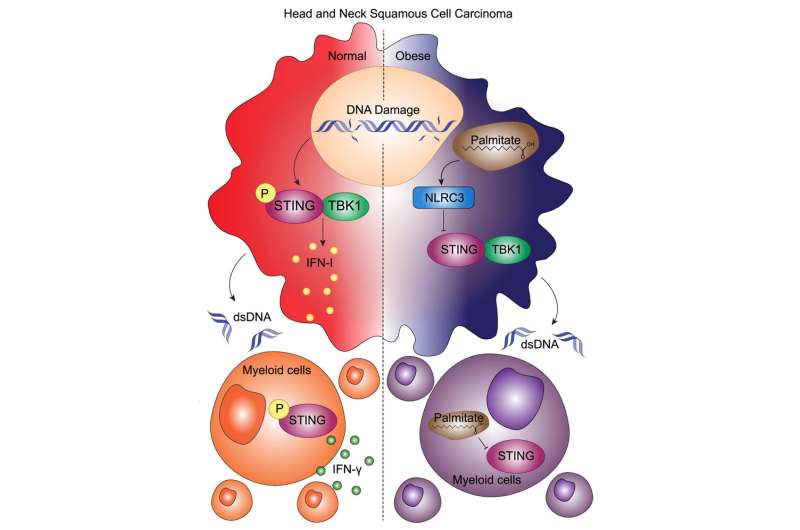This article has been reviewed according to Science X's editorial process and policies. Editors have highlighted the following attributes while ensuring the content's credibility:
fact-checked
peer-reviewed publication
trusted source
proofread
Study links obesity with dampened immune detection of oral cancers

A team from the University of Michigan Rogel Cancer Center and School of Dentistry, led by Yu Leo Lei, D.D.S., Ph.D., have identified a mechanism in mice for how obesity affects some oral cancers' ability to escape from the immune system.
This study, published in Cell Reports, found that obesity helps to establish a type of tumor microenvironment that promotes tumor progression. How exactly this happens lies in the relationship between the saturated fatty acids, the STING-type-I interferon pathway, and NLRC3.
"We tend to think about the increased risks for gastrointestinal tumors, breast cancer, pancreatic cancer, and ovarian cancer when it comes to obesity," said Lei, a pathologist-immunologist and lead author of this study. "Multiple recent prospective cohorts involving millions of individuals from several continents revealed a previously underappreciated link between obesity and oral cancer risks."
"Myeloid cells in obese mice were insensitive to STING agonists and were more suppressive of T cell activation compared to the myeloid cells from leans hosts," explained Lei. This feature drove the loss of immune subsets that were crucial for anti-tumor immunity in the tumor microenvironment.
The team found that saturated fatty acids can block the STING pathway, which is induced by cytosolic DNA and promotes antigen-presenting cell maturation, by inducing a protein called NLRC3.
Lei says this is the first study establishing a mechanistic link between obesity with oral cancer immune escape. "We're excited about the translational implications," he continued.
Obesity is a common comorbidity in cancer patients. Two recent studies found that oral cancer patients who were on statins—medicines that lower cholesterol—showed improved overall and cancer-specific survival. "This study establishes a mechanistic link for those observations and highlights the potential of targeting fatty acids metabolism in remodeling the host anti-tumor immune response," said Lei.
Next, Lei's team will explore how obesity regulates other immune-activating pathways and identify novel intervention targets for better oral cancer prevention in high-risk individuals. More work must be done before this can move to the clinic.
Additional study authors include Blake Heath, Ph.D.; Wang Gong, research Investigator at the School of Dentistry; and Hülya Taner, D.D.S.-Ph.D. candidate.
More information: Blake R. Heath et al, Saturated fatty acids dampen the immunogenicity of cancer by suppressing STING, Cell Reports (2023). DOI: 10.1016/j.celrep.2023.112303




















